By Mark Ellis —
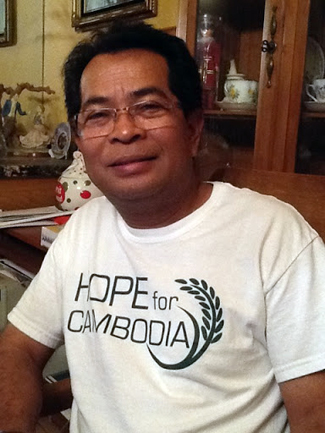
He grew up in the palace of the king, but after the Khmer Rouge came to power in Cambodia he lost his privileged lifestyle and nearly his life. After he found Christ in a refugee camp, he became a soul-winner himself – bringing hope to one of the most notorious monsters of the killing fields.
“I was raised in a Buddhist family,” says Christopher LaPel, founder of Hope for Cambodia. His father worked in the palace of King Sihanouk and as a boy, he often spent time there.
One day as he explored the palace he approached an engraver working in the basement. “Could you make a cross for me?” he asked the man.
Christopher had seen the iconic symbol atop churches in Phnom Penh and in movies, but didn’t know what it meant. He felt drawn to it, however, and was pleased when the man agreed to make one for him out of ivory, which Christopher began to wear around his neck.
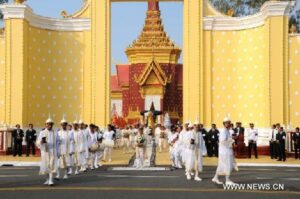
One evening at the dinner table with his parents, he leaned forward and the ivory cross slipped into view from the inside of his shirt.
Christopher’s father saw it for the first time and his face grimaced. With a low growl, he let out an expletive and then said, “I don’t like you to wear that cross.”
Set back in his chair by his father’s visceral reaction, the younger LaPel agreed to take it off. “Every meal I removed it, even though I loved it,” he recalls.
Khmer Rouge takes power
In 1975, when Christopher was in his late teens, the Khmer Rouge came to power. Led by Pol Pot, they changed the name of the country to Democratic Kampuchea and began to model their governing style after Mao’s China.
They forced people out of the cities, and sent them on forced marches to rural work camps. Their aim was to
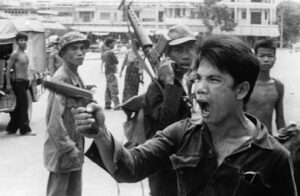
refashion the country’s agriculture on the model of the 11th century and discard all Western influences. They even destroyed temples and libraries.
They demanded that the entire population of 2.3 million vacate the capital city of Phnom Penh within three days, including the elderly, children, monks, doctors and nurses, hospital patients, wounded and sick people, even mothers who had just given birth.
Christopher saw masses of people swarm through the streets and the entire city emptied.
The Khmer Rouge said they would be leaving for a few days, but the evacuation turned into a three-year ordeal, with most of the population enduring extreme hardships. “Nearly everyone was either executed, faced starvation, or were worked to death,” Christopher recounts with sadness. During their violent rule, 2.5 million perished, almost a third of the population in what became known as the Cambodian genocide.
His parents both died, along with his brother and sister. “They forced my father to work until he died,” he says. His mother and sister worked 14-16 hour days doing hard manual labor until they died. His brother was executed.
Christopher worked in the fields with other young people and then spent time helping to build a dam. “We worked 16-hour days with our hands,” he says.
His body got weaker and weaker due to the workload and lack of adequate nutrition. Christopher got sick and missed work for three days. “Usually they kill you if you miss work three days,” he notes.
On the third night, he received a call to report to the Khmer Rouge army headquarters. “Everyone they called at night never came back; they disappeared,” Christopher says.
After he reported, they took Christopher to a hut where they yelled at him to get down on his knees. “Are you really sick?” one officer demanded.
Weak and almost delirious from fever, Christopher could barely keep from falling over. His cross fell off from his neck and he grabbed it, clutching it in his hand.
“He really looks sick,” one officer said. “Why don’t we let him rest.”
Christopher couldn’t believe his ears. Even more amazing, he was transferred to a hospital. While he couldn’t understand the meaning of the cross, he felt that in some mysterious way, it bought him a measure of grace in these desperate circumstances.
Christopher’s body recovered sufficient strength for him to return to work, but shortly after that, Vietnam invaded Cambodia. He was only 35 kilometers from the Thai border, and one night, the Khmer Rouge disappeared. “That night we ran for our lives,” he recalls.
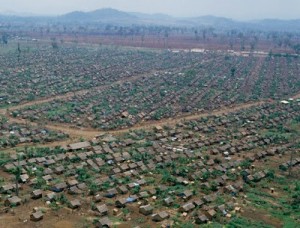
He had no idea where his family might be – or if any of them were still alive – but he fled across the border into Thailand, and landed in the Khao- I-dang Refugee Center run by the U.N. When he arrived at the camp he realized that somehow, in the chaos and confusion of his flight, he lost his ivory cross.
On that first day at the camp, a call went out for translators, and because he could speak some English and French, he was chosen.
The meaning of the cross
At a supplementary feeding center, he met a missionary from the U.K., working with Christian Outreach. “She spoke to me personally in French and Thai,” he recounts.
“She told me that Jesus Christ died on the cross for my sins.” His eyes grew wide as he suddenly understood the meaning of the cross for the first time.
“This is the answer I’ve been waiting for,” he said excitedly.
The woman explained the gospel message to him, and Christopher surrendered his life to Jesus Christ.
“I rejoiced in that moment,” he recalls. Christopher felt peace, joy, love and hope flood his soul in ways he had not felt before.
“I want to tell my people about Jesus,” he told the woman. “I want to serve Him the rest of my life.”
As Christopher began to follow Jesus, he experienced a “180-degree change” in his life. He also met a young Christian woman named Vanna who became his wife.
Through some remarkable circumstances, they were able to immigrate to the United States in 1980. “We were only married a week and we arrived in Lincoln, Nebraska,” he recalls. “It was all white and super cold.”
Five years later, they moved to Long Beach, California, and Christopher attended Hope International University. He was eventually ordained and became active in a Cambodian-American church.
In 1992, he made his first trip back to Cambodia. Then he began to minister in the refugee camps, just as he had been ministered to as a younger man. He was also on a quest to find his family. Sadly, he discovered the horrible outcome of the killing fields for his parents and two siblings. But four of his brothers and sisters were still alive!
“I found my brothers and sisters and they were all able to come to America and become believers,” he says.
With one of the elders from his church in the U.S., they went to Cambodia and planted a small fellowship of believers in the Battambang area. “We started with one, then it grew to five, then the fellowship grew to 27, then 56,” he says. Today, there are 150 churches planted in northwest Cambodia that grew from that one fellowship. Average Sunday attendance at these churches is 7,500.
A killer comes to Christ
Where death once reigned in the killing fields of northwest Cambodia, new life has arisen in Christ. Perhaps one of the most remarkable stories of a transformed life happened after Kang Kek Iew, also known as Comrade Duch, showed up at one of the leadership training seminars Christopher conducted in 1995.
When he showed up at the training, Duch was using an assumed name, Hang Pin, and did not want anyone to
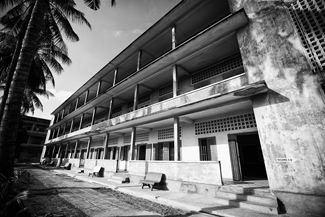
know his true identity. He had been the head of internal security for the Khmer Rouge and headed the infamous S-21 prison camp in Phnom Penh where thousands were tortured and killed. Of the 17,000 who entered the doors of S-21 as prisoners, only 10 are known to have survived.
After prisoners were interrogated and tortured, Duch personally ordered their executions with chilling notations to his underlings. Notes found after the war included his command to “smash to pieces,” written on a list of teenagers and children, or to “take away for execution” or keep for “medical experiment” on a list of women.
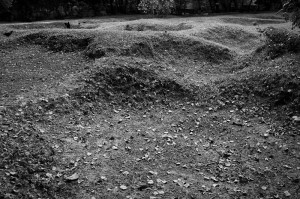
Blood was completely drained from over 100 prisoners to use for transfusions on wounded Khmer Rouge soldiers. In many ways, Duch ranks as one of the worst war criminals in modern history – seemingly beyond redemption.
Christopher took note of him when he came to one of the prayer meetings. “He had recently lost his wife and he was hopeless and depressed,” Christopher says.
At the end of the meeting, Duch approached Christopher to talk.
“My sin is so deep,” he told Christopher.
“As long as you confess your sins and turn away from them and believe on the Lord Jesus, you will be saved,” he told Duch.
Duch’s head hung down, as he recognized his responsibility for thousands of deaths and atrocities in the killing fields. As tears rolled down his cheeks, he confessed his sin, and realized that the penalty for all those sins – and the enormous burden of guilt he carried — had been transferred to Jesus on the cross.
“The next day I baptized him and his life completely changed,” Christopher says. “He moved from the back row of the church to the front row.” Christopher knew he had done some horrible things in his past, but still didn’t know his true identity or the extent of his war crimes.
After two weeks, Duch went back to his village and started a house church that quickly grew to 14 families. With training and oversight from Christopher, Duch became a lay pastor. Christopher also led Duch’s sister to Christ.
In late 1998 or early 1999, Christopher received a letter from Duch asking for prayer. He planned to publicly confess his crimes and turn himself over to government authorities. What kind of crimes did he commit? he wondered.
Christopher learned Duch’s true identity after he received a phone call from an AP reporter. When he learned the truth, he could barely speak. The man he led to Christ was one of the key leaders of the Khmer Rouge – who were responsible for killing his parents, two siblings, and thousands of his countrymen.
In 2007, Duch was formally charged with war crimes and crimes against humanity by a U.N.-backed court in
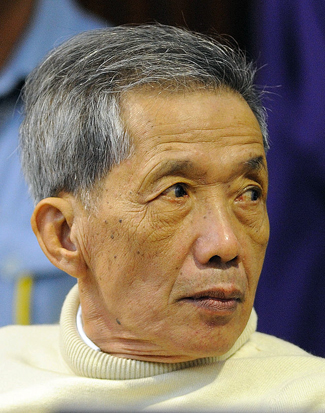
Cambodia.
During the trial, Duch was taken to the site of the former prison camp. Overwhelmed by the horrible memories – and God’s transformative power in his life — he said, “I ask for your forgiveness – I know that you cannot forgive me, but I ask you to leave me the hope that you might.”
Duch admitted his crimes before the court, including his role in the deaths of some 12,000 prisoners, and received a sentence of 35 years. This was later changed to life in prison due to the “shocking and heinous” nature of his crimes, with no chance of appeal.
Christopher testified at Duch’s trial. For an hour and a half, Christopher testified about the power of Christ to lead a person to repentance and of God’s grace. He talked about Christ’s ability to transform and rebuild a life. He did not ask for leniency for Duch, but he did speak about the reality of his remarkable change. International lawyers, judges, and 500 spectators listened in rapt attention.
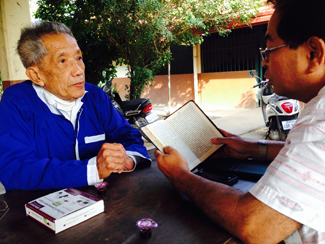
After Duch was imprisoned, it was 10 years before Christopher saw him again face to face. When they met, Christopher did not react with hatred or anger due to the prior deception or Duch’s role in his own family’s loss. Instead, Christopher looked Duch in the eye and said, “I love you and I forgive you.”
Today Duch is still in prison and has worn out one Bible that Christopher replaced with another. “I meet with him every time I go to Cambodia,” Christopher says. “We pray, break bread, and have communion together,” he says.
“We are all guilty sinners,” Christopher notes. “Jesus Christ is the only hope of the Cambodian people. He is the only one who can change a life from a killer to a believer.”
If you want to know more about a personal relationship with God, go here




I was so blessed and my heart touched by the story of your conversion and incredible faith. Also overwhelmed by your ability to forgive the man responsible for the death of so many innocent people as well as your family members. Thank you for sharing and for blessing so many. May God richly bless you.
Absolutely inspiring! Oh the wonder of God’s grace who can be compared to Him! Thank you so much for sharing. I have shared it around the net and shall continue to do so. God Bless you. I would one day like to go to Cambodia to preach the gospel God Willing. I have a prayer diary specifically for Cambodia and pray each day for different things and areas.
jacqui x
Thank you to the one true living God for your ministry and for your witness of the transforming power of our Savior.
This show s God amazing power to bring His Grace into the lives of those so far away from Him John 3v16 For God so loved the world He gave His only Begotten (Son Jesus to Die for all mankind ) That whosoever believes will have ever lasting life. All we need to do is believe in our Heart and confess with our lips Jesus is the Christ.
Wow! Lord Jesus saves the worst sinner……
God is the most Forgiving, we repent to Him only and worship Him only.
No soul shall bear the sins of another soul
May God guide us all to the truth.
Comments are closed.